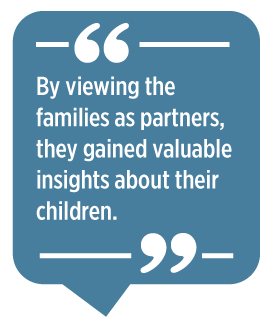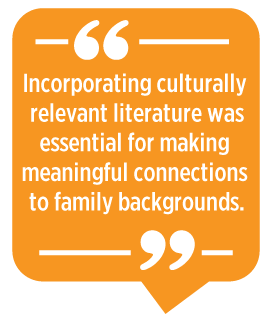6 Practical Guidelines for Successful Family Engagement
by Stephanie Wasta and Ekaterina Koubek
 As teacher educators, we are constantly striving to
improve the learning opportunities of our preservice teachers (PSTs) to enable
them to gain strategies and insights for becoming effective English language
teachers. One area of interest for us is learning how to honor families' funds
of knowledge and to promote two-way meaningful relationships between teachers
and families. Many of us say that we value the notion that “It takes a village
to teach a child,” but how well do we really live that
ideal?
As teacher educators, we are constantly striving to
improve the learning opportunities of our preservice teachers (PSTs) to enable
them to gain strategies and insights for becoming effective English language
teachers. One area of interest for us is learning how to honor families' funds
of knowledge and to promote two-way meaningful relationships between teachers
and families. Many of us say that we value the notion that “It takes a village
to teach a child,” but how well do we really live that
ideal?
Several research studies reveal that teacher
education programs are falling short in preparing PSTs to work with families
and providing community field-based experiences (Cochran-Smith &
Villegas, 2017; Miller et al., 2013; Sutton et al., 2020). Morales-Alexander
(2020) has also criticized teacher preparation programs and their family
engagement coursework because they do not adequately prepare PSTs to work with
multilingual learners of English (MLEs) and their families, perpetuating their
own biases instead of affirming those they are partnering with. Yet, other studies
provide glimmers of hope. Smith and Sheridan's (2019) study found that teacher
preparation programs did have positive impacts on teacher family-engagement
outcomes when teachers received instruction about family engagement. Teachers
felt more confident in building and sustaining relationships with families and
recognized benefits such as communication strategies, collaborative planning,
and problem-solving.
We wanted to learn more about our own graduate
program’s outcomes and how they influenced PSTs’ views on family engagement.
Our PSTs completed a community-based semester-long practicum with a migrant
education student in their home while also taking linguistic and cultural
diversity coursework. What tips could we gain from our students as they
reflected on their coursework and experiences? This article addresses six
themes that emerged from our qualitative research study. We focused on the
reflections of three of our PSTs who tutored an MLE weekly for 1–2 hours. Their
remarks provided practical guidelines for successful family engagement.
1. View Parents and Guardians as Partners
Our PSTs mentioned many ways that they viewed their
relationship with families as a meaningful partnership; they considered
themselves part of a team effort to nurture the MLEs they instructed. By
tutoring in the families’ homes, our PSTs witnessed firsthand ways that
guardians conveyed their support of their children’s education, often through
questions and their interest in their children’s academic progress. These
experiences affirmed for our PSTs that educators should be mindful that they
are working with a family, not just a student.
 Furthermore, by cultivating warm, genuine
relationships with the parents, they also grew in their understandings of the
families’ cultures, an important asset for creating a meaningful learning
environment for the MLE. Our PSTs recognized that by viewing the families as
partners, they gained valuable insights about their children that they may have
missed without those interactions. Additionally, as trust between the PSTs and
guardians grew, the PSTs began consulting with the guardians, acknowledging
their authority in some school-related decision-making processes.
Furthermore, by cultivating warm, genuine
relationships with the parents, they also grew in their understandings of the
families’ cultures, an important asset for creating a meaningful learning
environment for the MLE. Our PSTs recognized that by viewing the families as
partners, they gained valuable insights about their children that they may have
missed without those interactions. Additionally, as trust between the PSTs and
guardians grew, the PSTs began consulting with the guardians, acknowledging
their authority in some school-related decision-making processes.
Finally, because the PSTs viewed the parents as
partners, they also started to advocate for them. Their reflections conveyed
concern that outsiders might not view the parents as invested in their children
and therefore needed others to champion for them and counter biased remarks.
2. Invest Time for Building Relationships and Developing
Cultural Competence
Related to Theme 1, our PSTs acknowledged that to
build meaningful relationships with families, and consequently gain knowledge
and skills in cultural competence, required a significant time commitment. To
develop a rapport with families demanded consistent and intentional efforts to
meet with and learn from families. Often the PSTs did not note a significant
breakthrough in cultivating trust with their tutees’ parents until at least
halfway through the semester. Yet, when that experience happened, the benefits
were profound. They found themselves engaging in meaningful conversations about
the MLEs’ learning experiences and assisting the parents in understanding U.S.
school norms. These practices enabled our PSTs to gain more nuanced
understandings of the families’ beliefs and their experiences in a new country.
Ultimately, these relationships boosted their cultural competence as the PSTs
grew in empathy for and awareness of the families they served.
3. Plan Instruction With Family Background Considerations
As the PSTs cultivated relationships with the
families and tutees, they began to understand the value of incorporating their
students’ background experiences and interests in their lessons. Often, their
reflections conveyed a missed opportunity, and other times included adjustments
they made to better support their MLEs’ academic experience.
For example, Kathy discussed her use of games and
art-related activities to tap into her kindergarten student’s interest in these
strategies as he was learning basic English skills. Though beneficial, she
contemplated that conducting research on his home country could have enabled
her to incorporate games relevant to his experiences in Cuba. In turn, she
could have learned from him and potentially created more effective learning
opportunities.
Another participant, Ting, made numerous attempts
to incorporate culturally responsive literature in her sessions before finding
a book that was meaningful to her tutee. She first selected a book that had
cultural relevance to her own identity—Dumpling
Soup—before finding an appropriate Latinx-related book that
resonated with her student. These incidents revealed the need for “trial and
error” experiences throughout the practicum semester. Moreover, these
experiences resulted in PSTs believing that incorporating culturally relevant
literature was essential for making meaningful connections
to family backgrounds.
4. Value Home Language in Family Interactions
Our PSTs promoted an emphasis on incorporating the
home language of their tutees in different kinds of family interactions. The
focus was not on fluency of the home language, but simply
learning a few words. By attempting to learn some vocabulary or phrases, PSTs
signaled that they valued the family’s culture and were seeking to equalize
power differentials that could be perceived between them.
Some PSTs assisted in translating school documents,
and others spoke a few words or phrases in Spanish while teaching their
lessons. In both cases, PSTs mentioned that the home language aided in
communication between the parents and the teacher and promoted a warmer
relationship between them. Being vulnerable in using the tutee’s home language
fostered more open relationships between PSTs and the families.
5. Engage in Home Visits for Deeper Understandings of
Multilingual Learners of English
As a result of this experience, our PSTs began to
understand the role of home visits to better support MLEs and their families.
By being tutored at home, MLEs felt at ease to share their school successes and
challenges with their tutors. For example, Madison discovered her tutee’s
experiences of being discriminated against on the school grounds; she felt that
her tutee had confided in her because of the trust they had developed during
her home visits. Not only did Madison learn about her tutee’s challenges at
school, but she also used them when planning lessons to support her tutee’s
future interactions with others.
 Consequently, our PSTs started to embrace an
advocacy role toward their MLEs and their families through this home tutoring
experience. Firsthand seeing guardians and parents care for their children’s
education and wellbeing made the PSTs realize that home visits provide
authentic perspectives of the MLEs’ living situations and the communities in
which they reside.
Consequently, our PSTs started to embrace an
advocacy role toward their MLEs and their families through this home tutoring
experience. Firsthand seeing guardians and parents care for their children’s
education and wellbeing made the PSTs realize that home visits provide
authentic perspectives of the MLEs’ living situations and the communities in
which they reside.
6. Recognize Cultural Norms to Help Families Navigate
Them
The final theme is an emerging one. It only occurred
in Kathy’s reflections as she witnessed challenges that her MLE’s parents
encountered. During one of her visits, the tutee’s mother showed her a purchase
form from the school with an opportunity to buy her child’s art on a mug or
magnet. Not knowing the English language and cultural norms, this mother felt
obliged to purchase the item but did not have the funds to do so. Kathy was
able to explain to her that this was an option, and not an obligation.
This situation affirmed our PST’s new understanding
that school letters and forms can have negative consequences if families do not
have cultural competence to understand them. In another example, Kathy
witnessed an unexpected visit from the migrant education organization to the
tutee’s home. Because the family was not informed of this visit, they became
increasingly concerned. This incident helped our PST to understand the role of
communication to protect the well-being of MLEs and their families. Because of
her home tutoring, she was able to learn some valuable lessons about
differences in cultural norms, the role of clear communication between school
and home, and her role of being more than an instructor but also an advocate
for her MLEs and their families.
Final Thoughts
The various lessons that emerged from our study
suggest our TESOL program is on the right track for guiding PSTs with family
engagement. By being placed in a situation that provided regular and purposeful
interactions with families, our PSTs had opportunities to engage with families
and foster relationships with them. They also could rely on linguistically and
culturally relevant theories and strategies they were learning in their
coursework. Additionally, the weekly reflection practices in the form of
journaling and class discussions provided them a space to thoughtfully
contemplate their relationships with students and their families.
However, because of several “trial and error”
occurrences, we realize that we still have more work to do pertaining to
effective mentoring. Yet, Kathy’s reflections leave us hopeful: “I think it’s
important to realize that you’re not only working with students in an education
setting, you’re also working with family or their parents or guardians that are
also with them.”
Note: For more information on this study,
please see
Mentoring
and Reflective Teachers in ESOL and Bilingual Education.
References
Cochran-Smith, M., & Villegas, A. M.
(2017). Research on teacher preparation: Charting the landscape of a sprawling
field. In D. Gitomer & C. Bell (Eds.), Handbook of research
on teaching (5th ed., pp. 439–538). American Educational Research
Association.
Miller, G. E., Lines, C., Sullivan, E., &
Hermanutz, K. (2013). Preparing educators to partner with families.Teaching Education, 24(2), 150–163. https://doi.org/10.1080/10476210.2013.786889
Morales-Alexander, Y. (2020). “School is the
child’s second home”: Family engagement from a Latino sociocultural
perspective. Journal of Early Childhood Teacher Education, 42(4), 455–473. https://doi.org/10.1080/10901027.2020.1799118
Smith, T. E., & Sheridan, S. M. (2019). The
effects of teacher training on teachers’ family-engagement practices,
attitudes, and knowledge: A meta-analysis. Journal of Educational and
Psychological Consultation, 29(2), 128–157. https://doi.org/10.1080/10474412.2018.1460725
Sutton,
K. K., Lewis, K. D., & Beauchat, K. A. (2020). The role of teacher
preparation programs in fostering preservice teachers’ ability to effectively
engage with families. School Community Journal, 30(2), 39–52.
Dr. Stephanie
Wasta earned her PhD in social foundations
of education at the University of Iowa. She is a professor and graduate
director in the College of Education at James Madison University. Dr. Wasta is
the past president of the Virginia chapter of the National Association for
Multicultural Education. Her research interests include culturally responsive
teaching practices, the use of multicultural literature in social studies
education, and equity practices to support multilingual
learners.
Dr.
Ekaterina Koubek holds a PhD in second
language acquisition/foreign language education from University of
Nebraska-Lincoln. She is a professor and TESOL coordinator at James Madison
University. She is Teacher Education SIG Leader for VATESOL and the incoming
co-chair of the Professional Standards Council for TESOL International
Association. Her research interests include preservice teacher attitudes and
beliefs, action research in teacher education, high-impact practices, and
culturally responsive and sustaining practices.